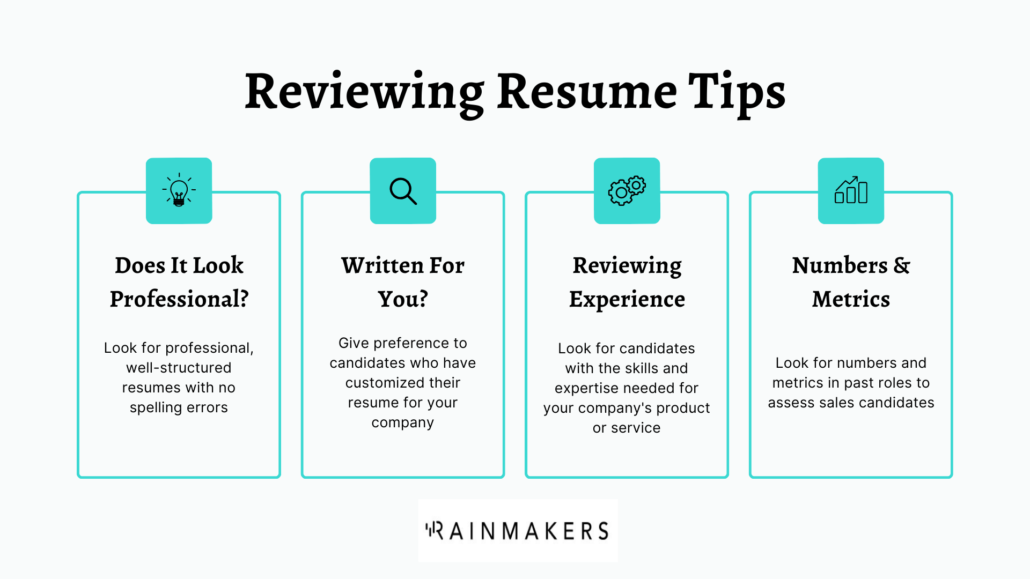Mastering the Art of Salesperson Evaluation: Tips for Hiring Managers
Evaluating Sales Potential – Checklist for Hiring Managers
One of the most challenging tasks Sales Managers must deal with is evaluating a candidate in a job interview. With entry-level positions such as Sales Development Representatives (SDRs) and even Account Executives (AEs), many won’t have a wealth of sales experience. On top of that, entry-level roles tend to get a lot of applicants, and trying to isolate the best candidates from the crowd is challenging.
The good news is that there are reliable ways to evaluate sales candidates at every stage, from initial screening to final interviews.
Here are some essential recruitment tips for hiring managers.

Reviewing Resumes
While the stack of resumes on your desk is daunting, there are simple ways to identify the best candidates among job applicants. First, use this method to kick off your screening process:
Does It Look Professional?
A resume’s format can disclose a lot about a job seeker. For example, a well-structured resume with few or no spelling errors suggests the individual is committed, detail-oriented, and possesses a sense of professionalism.
Was It Written For Your Company?
Check the candidate’s cover letter and job objectives. Does the candidate seem to understand your business, or does it seem they sent the same resume to dozens of companies? Give preference to candidates who have done some research and know your company’s needs, history, and mission.
Reviewing Work Experience and References
Every candidate should have at least a little work experience or an internship for you to review. The candidate’s work experience can provide insight into their values, work ethic, and skills.
When considering a candidate, contact their professional references to learn more about them. Avoid candidates who provide only personal references.
Reviewing Skills and Experience
Your company’s product or service may require technical knowledge or industry experience. Therefore, favor those applicants who already possess the abilities and expertise you need.
Keep an open mind when looking at skills and experience. You may discover unique yet promising skills that could prove helpful. They could even provide some fresh perspectives to your sales team.
Did They Try To “Game” the System?
This is a relatively recent phenomenon in which some applicants may try to embed specific phrases into a resume that aren’t visible to human readers but are picked up by hiring software looking for particular keywords.
While the technical know-how to pull this off may seem impressive to some hiring managers, it does suggest a certain lack of ethics and respect for the hiring process. Proceed with caution.
Are There Numbers and Metrics In The Resume?
One of the most foolproof ways to assess a sales candidate is by the numbers they have produced in past roles. This might mean emails sent, revenue produced, or contracts upsold.
A good sales candidate should never be shy or try to hide their numbers. In fact, they should be proud of any quotas or goals they have beaten in the past.

The Initial Interview
An initial interview—phone or in person—will assist you in deciding if a candidate is right for your department. Here are some things to consider.
Do They Come Across As Professional?
Look at how the applicant conducts themself. This will demonstrate how they will come across to potential clients. Professionalism is a must. So are punctuality, sincerity, and politeness. All the better if the candidate also demonstrates comprehensive knowledge of your business’s products or services.
In many ways, an initial interview is a sales pitch. Use that perspective to help assess the interviewee.
How Well Do They Communicate on the Phone?
Many sales or hiring managers conduct initial interviews via phone. This provides an opportunity to see how well a candidate communicates by phone. Considering many sales calls are started this way, it’s an essential skill to filter for. Also, have the applicant leave a sample voicemail message. This, too, will help you see how effectively they can communicate with prospects.
Do They Possess the Traits You Value Most for Your Sales Team?
Effective sales departments prioritize skills like drive, thoroughness, and communication. Create a list to score candidates on your top sales rep attributes. You can use these scores to help compare and contrast various skill levels if you have multiple applicants.
Ask Challenging Questions
How well does a candidate respond to difficult questions? Can they think (and answer) under pressure? Consider asking how they deal with rejection. Ask them about how they managed to learn a complicated skill. Ask about past challenges and how they overcame them.
The classic “what would you say is your biggest weakness?” question may seem cliche, but it helps learn how self-aware and open to feedback a candidate is. It also demonstrates how seriously they respond to the question and how honest they are.

The Later Stage Interviews
After interviewing an exhaustive list of candidates, you can narrow the search and bring in only the most promising candidates for a more in-depth discussion.
Ask for a sales demonstration.
Before they come in, request that candidates prepare a sample sales presentation. This should ideally be for one of your products or services so the candidate can display their knowledge, or they could choose something entirely different to see how well they can convince you to buy something you’re unfamiliar with.
The actual purpose of the demonstration is to see how much sales potential they have. It may be challenging, but it can give you a good feel for their fundamental sales abilities and their approach to the challenge and the process.
Take on the role of a potential customer who objects to the sales pitch. Take into account how the candidate responds to these concerns. Do they listen well, or do they immediately go on to the pitch’s next section?
After the presentation, provide the candidate with practical criticism to determine whether or not they are coachable.
Ask Out About Long-Term Goals
When you hire a new sales representative, you expect they’ll find a way to grow with your business. So inquire about the candidate’s long-term objectives and passions. Are they hoping to take on high-ticket clients? Are they interested in management? Do they have a particular affinity for marketing or customer service?
Think about how realistic these objectives are. Can you see this person progressing within your business?
Conduct a Culture Check Walkthrough
Talk a walk through the company and introduce the candidate to others. Try to hit different levels within the company, such as other salespeople, receptionists, factory floor employees, and members of upper management.
Can you see this candidate blending in with your culture, or do they withdraw when the CEO or a Senior Sales Manager is around? Remember that a candidate’s capacity for good communication with management can indicate their potential for interaction with sales prospects.
Offer the candidate the chance to see your business in operation. Invite the applicant to listen in on a sales call with one of your Account Executives. Their follow-up questions will reveal a lot about their sales philosophy and suitability for your business.
Also, after the interview, ask the people who met the candidate on your walkthrough for their opinions. Even though, as the hiring manager, the final decision is yours, input from others can always be helpful.

Recruiting With Rainmakers
Following the above should handily assist you in finding the ideal applicant for your open entry-level sales representative position. The most important factors to remember are the candidate’s professional demeanor, applicable skill set, and cultural compatibility.
When faced with many applicants, consider hiring recruitment specialists such as the ones at Rainmakers to help make your job easier. They have a proven history of matching ideal candidates with the best businesses, so everyone wins in the end.
Sign up and connect with our team today to learn more.










